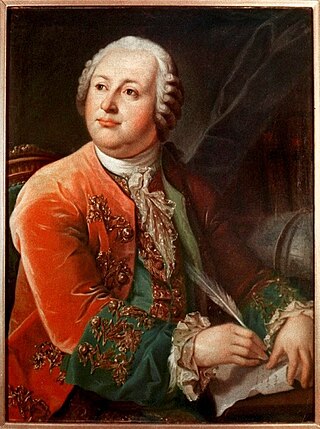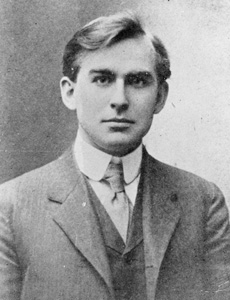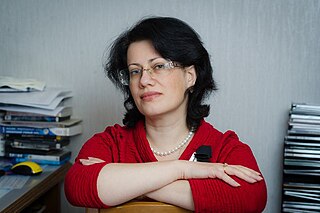Elena Fedorova (August 24, 1927, Moscow - May 18, 2015, Moscow) was a Soviet and Russian scholar of antiquity. She was a doctor of philology, specialising in classical philology and cultural history. [1]
Elena Fedorova (August 24, 1927, Moscow - May 18, 2015, Moscow) was a Soviet and Russian scholar of antiquity. She was a doctor of philology, specialising in classical philology and cultural history. [1]
Elena Fedorova was the daughter of the Soviet theater and film director Vasily Fedorov. She graduated from the Department of Classical Philology of the Faculty of Philology of Moscow State University. From 1958 she worked at the Department of Ancient Languages of the Faculty of History of Moscow State University; Professor. [2]

Mikhail Vasilyevich Lomonosov was a Russian polymath, scientist and writer, who made important contributions to literature, education, and science. Among his discoveries were the atmosphere of Venus and the law of conservation of mass in chemical reactions. His spheres of science were natural science, chemistry, physics, mineralogy, history, art, philology, optical devices and others. The founder of modern geology, Lomonosov was also a poet and influenced the formation of the modern Russian literary language.

Yakuts or Sakha are a Turkic ethnic group who mainly live in the Republic of Sakha in the Russian Federation, with some extending to the Amur, Magadan, Sakhalin regions, and the Taymyr and Evenk Districts of the Krasnoyarsk region. The Yakut language belongs to the Siberian branch of the Turkic languages.

The Yukaghir languages are a small family of two closely related languages—Tundra and Kolyma Yukaghir—spoken by the Yukaghir in the Russian Far East living in the basin of the Kolyma River. At the 2002 Russian census, both Yukaghir languages taken together had 604 speakers. More recent reports from the field reveal that this number is far too high: Southern Yukaghir had maximum 60 fluent speakers in 2009, while the Tundra Yukaghir language had around 60–70. The entire family is thus to be regarded as moribund. The Yukaghir have experienced a politically imposed language shift in recent times, and a majority also speak Russian and Yakut.

The flag of the Republic of Sakha (Yakutia) (Yakut: Саха Өрөспүүбүлүкэтин былааҕа Saqa Öröspüübülüketin Bılaağa; Russian: Флаг Республики Саха (Якутия)), in the Russian Federation, is one of the official symbols of the Sakha Republic, alongside the coat of arms and the national anthem of the Sakha Republic. The flag has four horizontal stripes. From top to bottom, the stripes are light blue (3/4 of the flag's width), white (1/16), red (1/16), and green (1/8). The flag has been used officially as the flag of the Sakha Republic since 14 October 1992. The light blue stripe is charged with a white disc in the center. The diameter of the disc is 2/5 of the flag's width.

Tenney Frank was a prominent American ancient historian and classical scholar. He studied many aspects of Ancient Rome, for instance its economy, imperialism, demographics and epigraphy.
Attilio Degrassi was an archeologist and pioneering Italian scholar of Latin epigraphy.

Byzantine studies is an interdisciplinary branch of the humanities that addresses the history, culture, demography, dress, religion/theology, art, literature/epigraphy, music, science, economy, coinage and politics of the Eastern Roman Empire. The discipline's founder in Germany is considered to be the philologist Hieronymus Wolf (1516–1580), a Renaissance Humanist. He gave the name "Byzantine" to the Eastern Roman Empire that continued after the Western Roman Empire collapsed in 476 AD. About 100 years after the final conquest of Constantinople by the Ottomans, Wolf began to collect, edit, and translate the writings of Byzantine philosophers. Other 16th-century humanists introduced Byzantine studies to Holland and Italy. The subject may also be called Byzantinology or Byzantology, although these terms are usually found in English translations of original non-English sources. A scholar of Byzantine studies is called a Byzantinist.
Alexander Victorovich Fedorov is a Russian scientist, teacher, media education specialist, film critic. He completed his Ph.D. dissertation about media education (1993) at the Russian Academy of Education (Moscow).
Elena Palmer is a German journalist and author with Russian origins.
Diodor Valeryanovich Kolpinskiy was an Eastern Catholic priest from Russia and a member of the Russian apostolate.
Ljubov Zinovjevna Sova is a Russian philologist notable for contributions in the field of linguistics and orientalistics. Her main fields of professional interest include linguistics, African philology, semiotics, typology, Slavic languages and journalism.

Elena Georgievna Mestergazi is a Russian literary scholar who specializes in literary theory and 19th, 20th and 21st century Russian literature. She has also worked extensively on the life and oeuvre Vladimir Pecherin. As a doctor of philology (2008), she has authored monographs and journal articles and is an editor and member of editorial boards for several collections of domestic scientists' articles.

Andrey Aleksandrovich Fedorov was a Soviet Russian biologist, botanist, taxonomist and phytogeographer, who was from 1970 a corresponding member of the Academy of Sciences of the USSR. He was the brother of the botanist Alexander Fedorov (1906-1982).
Tatyana Aleksandrovna Kasatkina is a Russian philosopher, philologist, culture expert, religious scholar and writer. She is an expert in the field of theory of culture, theory of literature, philosophy, religious studies, the works of Fyodor Dostoyevsky and Russian literature of the 19th-21st centuries. She is Doctor of Philology, Head Researcher at the Gorky Institute of World Literature RAS, Head of the Centre “Dostoevsky and World Culture” at the Gorky Institute of World Literature RAS, president of the Research Committee for Dostoyevsky's Artistic Heritage within the Scientific Council for the History of World Culture, RAS. She is Editor-in-Chief of the peer-reviewed open-access journal "Dostoevsky and World Culture. Philological journal".
Nina Yakovlevna Dyakonova was a Russian researcher of 19th century English and European literature, full professor, Doctor of Philology, member of the Board of Directors of the International Byron Society, and member of the editorial board of the Russian academic book series Literaturniye pamyatniki. She was an authority in the history of English literature and links between European literatures with each other and with Russian literature, especially of the 19th century, following her professor Mikhail P. Alexeyev.

Petr Aleksandrovich Maslov – is a Russian graphic and installation artist, book designer. Grandson of the famous Russian sculptor Isidor Grigorievich Frih-Khar
Dal Konstantinovich Orlov was a Russian film critic, journalist, and screenwriter. He was an Honored Art Worker of the Russian Soviet Federative Socialist Republic.

Dmitry Anatolievich Sabinin (1889–1951) – Soviet botanist, plant physiologist, Vice-Rector (1923–1924), Head of the Department of Plant Physiology (1924–1929) of Perm University, Head of the Department of Plant Physiology of Moscow State University (1932–1948), Head of the Laboratory of the Institute of Plant Physiology of the USSR Academy of Sciences (1938–1941).